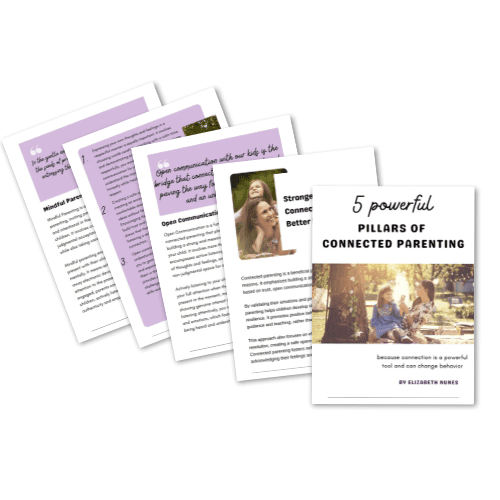How To Have siblings who Are Best Friends
As a mom of three children, one of the greatest joys I experience is watching them play and interact with each other.
There’s something truly special about seeing them laugh and have fun together, and knowing that they’re building a bond that will last a lifetime.
However, as any parent knows, getting siblings to get along can be a challenge at times.
While it’s normal for siblings to have disagreements and conflicts, I’ve found that there are a few things parents can do to help teach their children to be best friends.
In this post, I’ll be sharing some of my own experiences and tips for fostering a strong and positive relationship between siblings.
This post may contain affiliate links. Full privacy policy and disclosure here.

How To Teach Siblings To Be Best Friends
Teach Communication Skills
Communication is a vital tool for building any relationship, and teaching communication skills is an essential step in fostering a strong and positive relationship between siblings. Encouraging your children to talk to each other openly and honestly about their feelings is a crucial aspect of this. By teaching your children to express themselves verbally and to listen actively, you can help them to understand each other better and avoid misunderstandings.
Active listening is a critical skill that can help your children build strong communication skills. One way to encourage active listening is by teaching them to make eye contact when speaking to each other.
This shows that they are paying attention to what the other person is saying and that they value their opinion.
Encourage your children to listen carefully to what their sibling is saying and to repeat it back to them to show that they understand. This is a great way to avoid misunderstandings and ensure that both siblings are on the same page.
Interrupting can be a common problem when children are communicating with each other. Teach your children to avoid interrupting by waiting until their sibling is finished speaking before responding. This shows respect for their sibling’s ideas and feelings and helps to create a positive atmosphere for communication.
In addition to teaching active listening skills, you can also encourage your children to express their emotions in a healthy way. Encourage them to use “I” statements when expressing their feelings. For example, instead of saying “You always make me mad when you do that,” they could say “I feel upset when you do that.” This encourages your children to take responsibility for their own feelings and avoid blaming their sibling.
Encourage Shared Activities
Encouraging shared activities is a great way to help siblings bond and develop a sense of camaraderie. By finding activities that all of your children can enjoy together, you can create positive experiences and memories that they will cherish for years to come.
This also provides an opportunity for them to learn new skills and interests together, which can be a source of inspiration and support.
Shared activities can take many forms, depending on the interests and abilities of your children. For younger children, activities like playing board games or building with blocks can be great options.
As they get older, they may enjoy sports, music, or other hobbies. Going on family hikes or camping trips is another great way to bond and create shared memories.
When choosing activities, be mindful of your children’s interests and abilities. Try to find activities that are challenging but not overwhelming, and that allow them to work together towards a common goal. Be patient and encourage them to support each other as they learn and grow.
In addition to finding activities that your children can enjoy together, it’s also important to make time for one-on-one activities with each child. This allows each child to feel valued and appreciated as an individual and can help prevent feelings of jealousy or competition.
Foster a Sense of Empathy
Empathy is the ability to understand and share the feelings of others. Fostering a sense of empathy in your children can help them to build stronger relationships with each other and with others in their lives.
By learning to see things from another person’s perspective, they can develop a deeper understanding and appreciation of their siblings’ thoughts, feelings, and needs.
One way to foster empathy is by encouraging your children to put themselves in their sibling’s shoes. Ask them to imagine how they would feel if they were in their sibling’s situation. This can help them to see things from a different perspective and gain a better understanding of their sibling’s emotions.
Another way to promote empathy is by modeling it yourself. Show your children how to empathize with others by listening carefully to their concerns and responding with compassion and understanding. This can be especially important during conflicts between siblings.
When you mediate their arguments, try to validate both of their perspectives and encourage them to see things from each other’s point of view.
Teaching your children to express gratitude can also help to foster empathy. Encourage them to thank each other for kind gestures or thoughtful actions. This helps them to recognize and appreciate the positive things that their sibling does for them, which can help to build a sense of empathy and respect.
Encouraging your children to engage in acts of kindness towards each other is another way to promote empathy. This could be as simple as sharing a toy or helping with a chore.
By doing things for each other, they can learn to recognize and respond to each other’s needs, which can help to build a sense of empathy and compassion.

Help Them Learn to Resolve Conflicts
Siblings are bound to have conflicts and disagreements from time to time. As a parent, it’s important to help your children learn how to resolve these conflicts in a positive and constructive way.
This can not only help them to develop stronger relationships with each other, but it can also teach them valuable skills for dealing with conflicts in other areas of their lives. I learned a lot about conflict resolution from the A Fine Parent Academy.
One important step in helping your children learn to resolve conflicts is to teach them how to communicate effectively.
Encourage them to express their feelings and concerns in a calm and respectful way, and to listen actively to each other’s perspectives. This can help to prevent misunderstandings and defuse tense situations.
Another key component of conflict resolution is teaching your children to find common ground. Encourage them to look for areas of agreement and shared goals, and to focus on finding solutions that work for everyone involved.
This can help to shift the focus away from “winning” the argument and towards finding a mutually acceptable solution.
It’s also important to teach your children how to apologize and make amends. Encourage them to take responsibility for their actions and to make a sincere apology when they have hurt their sibling.
This can help to rebuild trust and repair damaged relationships.
Finally, it’s important to set clear boundaries and consequences for negative behavior. Let your children know that there are consequences for hurting or disrespecting their siblings, and follow through with appropriate consequences when necessary. This can help to create a sense of accountability and discourage negative behavior in the future.
Teaching your children to resolve conflicts in a positive and constructive way takes time and effort, but it can pay off in many ways.
By giving them the tools to communicate effectively, find common ground, make amends, and respect boundaries, you can help your children to build stronger relationships with each other and develop important life skills that will serve them well in the future.
Model Positive Relationship Skills
As a parent, you play a crucial role in shaping your children’s attitudes towards relationships. One of the most effective ways to teach your children positive relationship skills is by modeling them yourself.
Children learn by example, so by showing them how to behave in healthy and positive ways, you can help to set them up for success in their own relationships.
One way to model positive relationship skills is by demonstrating healthy communication. This includes active listening, speaking honestly and respectfully, and avoiding harsh criticism or blame. When your children see you communicate in a positive way with your partner, friends, or other family members, they will be more likely to adopt these same behaviors in their own relationships.
Another way to model positive relationship skills is by showing affection and appreciation towards your partner and other family members. This includes things like giving compliments, showing physical affection, and expressing gratitude for their contributions to the family. When your children see you express affection and appreciation towards others, they will be more likely to do the same in their own relationships.
It’s also important to model healthy boundaries and respect for others’ boundaries.
This means respecting your partner’s need for alone time, honoring your children’s personal space, and avoiding behaviors that might make others feel uncomfortable or disrespected.
When your children see you model healthy boundaries and respect for others, they will be more likely to set healthy boundaries in their own relationships and treat others with respect.
Finally, it’s important to model conflict resolution skills. This means avoiding aggressive or passive-aggressive behaviors, using “I” statements to express your feelings, and working together with your partner or family members to find mutually acceptable solutions to conflicts.
When your children see you model positive conflict resolution skills, they will be more likely to adopt these same skills in their own relationships.

Get Your Free Download
Take your parenting journey to the next level with our comprehensive ebook on Connected Parenting.
Download this ebook now and embark on a transformative parenting experience that will strengthen your bond with your child and bring joy and fulfillment to your family life.

